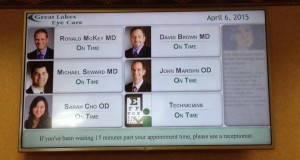This afternoon I made my way to a local eye-care facility to check my vision. It’d been 4 years, and I thought it was the responsible thing to do.
 Walking into the building, I counted 72 chairs in the waiting room, about half of which were occupied. How long would it be before my name was called? But then I saw a big airport-style electronic board that gave me a clue.
Walking into the building, I counted 72 chairs in the waiting room, about half of which were occupied. How long would it be before my name was called? But then I saw a big airport-style electronic board that gave me a clue.
As I sat down, it was encouraging to see that my doctor was running “on time.” The reassurance produced by those two words made me wish there was a similar screen I could check in reference to my communications with God. Once I’ve asked for his help through prayer, my next thought always is, “I wonder when he’ll answer.” An electronic board of “wait times” would be a big help.
Through the years I’ve heard countless sermons about the Lord’s timing. I’ve been told he’s never late with his answers to prayer but that he’s seldom early. In other words, he’s always right on time.
I’ve also heard that it’s unacceptable to bargain with God based on what we hope will happen when. In other words, we’re not to pray the calendar: ”Lord, if you’ll do ‘that’ for me by ‘this’ date, then I’ll do ‘the other thing’ for you.”
This is a demand masquerading as a prayer request and displeases God. So our only choice is to spell out the desires of our hearts (which he encourages) and then find a chair in God’s waiting room. Days pass –sometimes years– without anything happening, and we wonder if it’s true that God is never late.
A wise Bible teacher once told me to watch carefully for God’s timing of events, because it’s never without significance. Considering that, it probably isn’t wise to plead with God to act sooner rather than later. Might the end-result be disappointing if he decides to give us what we want by answering “now,” when he had intended something much better for “later?”
Put in that context, impatient waiting comes with a loss. God is in charge of the calendar and controls all of time. We know that from two episodes in Scripture when he (1) made the sun stand still, and (2) caused the sun’s shadow to move backwards on Hezekiah’s 15 steps…. not to mention his involvement “in the beginning” when he created time in the first place.
 So as we’re tempted to wonder what’s keeping him so long, we should weigh all the options. In the end, our best deal is to wait without complaint. And you never know; today I got called from the waiting room well before I thought I would. And sometimes God does that, too.
So as we’re tempted to wonder what’s keeping him so long, we should weigh all the options. In the end, our best deal is to wait without complaint. And you never know; today I got called from the waiting room well before I thought I would. And sometimes God does that, too.
“From everlasting to everlasting you are God.” (Psalm 90:2)
